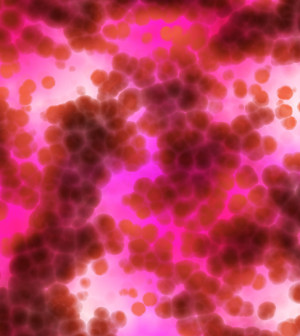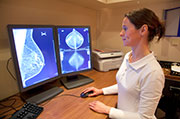- 7 Best Breads for Maintaining Stable Blood Sugar
- Gelatin vs. Collagen: Which is Best for Skin, Nails, and Joints?
- The Long-Term Effects of Daily Turmeric Supplements on Liver Health
- Could Your Grocery Store Meat Be Causing Recurring UTIs?
- Are You Making This Expensive Thermostat Error This Winter?
- Recognizing the Signs of Hypothyroidism
- 10 Strategies to Overcome Insomnia
- Could Artificial Sweeteners Be Aging the Brain Faster?
- Techniques for Soothing Your Nervous System
- Does the Water in Your House Smell Funny? Here’s Why
Added Radiation May Help Some With Early Breast Cancer


Some women who have surgery for early stage breast cancer may benefit from additional radiation to nearby lymph nodes, two new clinical trials suggest.
Researchers found that the extra radiation cut women’s risk of a breast cancer recurrence over the next decade. It did not, however, extend their lives.
The studies, both reported in the July 23 issue of the New England Journal of Medicine, aimed to answer an important question in breast cancer treatment: When women have early stage tumors removed, and cancer cells are found in just a few nearby lymph nodes, should those nodes be treated with radiation?
When no lymph nodes are involved, the choice is straightforward — no radiation, said Dr. Monica Morrow, a breast cancer surgeon at Memorial Sloan Kettering Cancer Center, in New York City.
On the flip side, when numerous lymph nodes are positive for cancer cells, radiation makes sense, she added.
Things get murkier when a woman has one to three nodes affected, said Morrow, who co-wrote an editorial published with the studies.
It’s already standard for women to receive radiation to the breast itself after having tumors surgically removed, explained Dr. Timothy Whelan, the lead researcher on one of the studies.
On top of that, most women receive chemotherapy, and often hormonal medications.
“It hasn’t been clear whether we need to irradiate the lymph nodes, too,” said Whelan, an oncologist at McMaster University and Hamilton Health Sciences Juravinski Cancer Center, in Ontario, Canada.
That is, the benefits of doing it should outweigh the risks, and lymph-node radiation can have side effects — such as short-term inflammation in the lungs, and chronic swelling in the chest, arms and hands (called lymphedema).
But the new findings, according to Whelan, suggest that the benefits could be worthwhile.
His team’s study involved 1,832 breast cancer patients who were all given standard therapy for early stage breast cancer, including breast radiation. Half were randomly assigned to have node radiation, too. Most had one to three affected lymph nodes.
Over the next 10 years, 82 percent of women who received node radiation remained recurrence-free — versus 77 percent of women in the comparison group.
Side-effect rates were relatively low, Whelan said. About 8 percent of the node-radiation group developed lymphedema; just over 1 percent had lung inflammation.
The most common side effect — skin rash — affected half of the women.
Chest radiation does carry the possibility of more serious complications, including damage to the heart or a second cancer. But, at least so far, those problems have not emerged in these patients, Whelan said.
“Computer technology has allowed radiotherapy to evolve in the last 20 years,” he said. “It’s much more targeted now, to avoid damage to the heart or other surrounding tissue. That might be why we’re not seeing some of these side effects.”
However, Morrow said that caution is in order.
“To me, these studies do not justify offering radiation to all women with one to three lymph nodes involved,” she said.
Overall, the difference in cancer recurrence was “obviously not big,” Morrow said. “And,” she added, “it didn’t translate into a difference in overall survival.”
After 10 years, 82 percent of study patients were still alive, regardless of whether they’d received node radiation.
The second study, of 4,000 European women, showed a similar pattern: Those who received node radiation had a somewhat lower risk of recurrence over 10 years; 72 percent remained free of breast cancer, versus 69 percent of the comparison group. But there was no clear advantage in overall survival.
Whelan said he suspects his study’s follow-up has not been long enough.
“We expect that over time, we’ll see a difference in survival, too,” he said.
Regardless, Whelan added, living the rest of your life free of breast cancer “is a good thing, too.”
Still, he agreed that “this therapy is not for everyone.”
Who is a good candidate? Whelan and Morrow both said further research is needed to sort that out.
For example, they said, there are tests on the market that look at the genetic profile of a breast tumor and judge its odds of recurrence. Those might prove helpful in choosing women who could benefit from node radiation.
For now, Morrow said she thinks the presence of cancer cells in one to three lymph nodes is not enough to justify the extra radiation.
Other factors, such as the size and aggressiveness of a woman’s cancer, should also come into play, she suggested.
In the real world, doctors are already offering node radiation to women like those in the studies.
Morrow suggested that those women ask some questions: “Ask your doctor why you’re a candidate,” she said. “Ask about the expected benefits, and ask about the side effects.”
More information
The American Cancer Society has more on breast cancer treatments.
Source: HealthDay
Copyright © 2026 HealthDay. All rights reserved.










